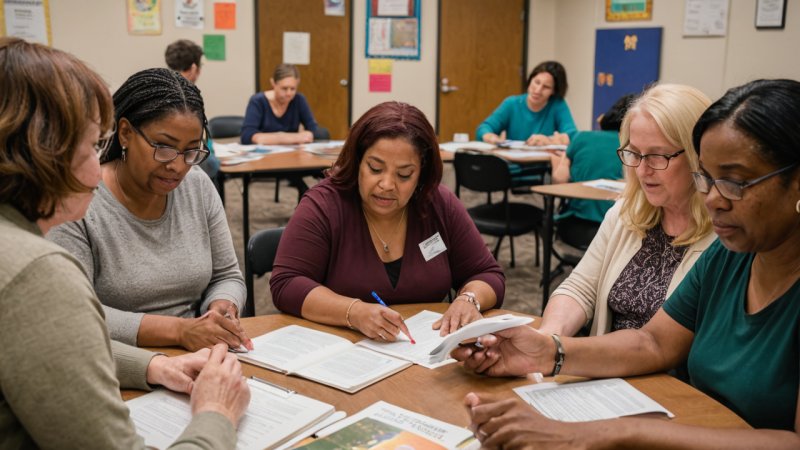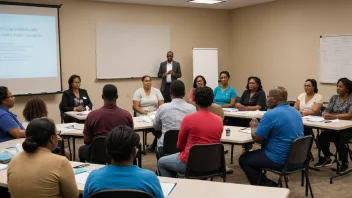Literacy is a fundamental skill that empowers individuals to navigate the world, access information, and participate fully in society. Despite the digital age's vast advances, adult literacy remains a significant challenge across the globe. Many adults struggle with reading, writing, and comprehension, which can hinder their personal and professional growth. This article aims to explore how to create engaging literacy workshops for adults, offering insights into effective teaching strategies, the importance of community involvement, and ways to foster a supportive learning environment.
The Importance of Adult Literacy
Adult literacy is crucial for individual empowerment and societal development. It enables adults to:
- Access Employment Opportunities: Many jobs require basic reading and writing skills. Literacy is often a prerequisite for vocational training and higher education.
- Participate in Community Life: Literate individuals can engage more effectively in their communities, understand local issues, and advocate for their rights.
- Improve Health Outcomes: Literacy affects health literacy, which is essential for making informed health decisions, understanding medical instructions, and navigating healthcare systems.
- Enhance Personal Growth: Adult literacy fosters lifelong learning, allowing individuals to pursue interests, hobbies, and further education.
Understanding Your Audience
Creating engaging literacy workshops begins with a deep understanding of the target audience. Adult learners come with diverse backgrounds, experiences, and motivations. Here are essential considerations:
Demographic Factors
Identify the age, gender, educational background, and cultural context of the participants. This information helps tailor the content to their specific needs.
Learning Styles
Adults have varied learning preferences, including visual, auditory, and kinesthetic. Incorporating different teaching methods can cater to these diverse styles.
Motivation and Goals
Understanding why adults want to improve their literacy skills is crucial. Some may seek better job prospects, while others might want to help their children with homework or engage more in their community.
Designing the Workshop Curriculum
The curriculum should be relevant, engaging, and practical. Here are key components to consider when designing literacy workshops:
Needs Assessment
Conduct surveys or interviews with potential participants to assess their literacy needs. This data can inform the curriculum, ensuring it addresses the specific challenges faced by the learners.
Setting Learning Objectives
Establish clear, achievable learning objectives that guide the workshop. Objectives should be specific, measurable, attainable, relevant, and time-bound (SMART).
Incorporating Real-Life Contexts
Integrate real-life materials, such as newspapers, menus, job applications, and health brochures, to make learning relevant and applicable. This approach helps learners see the practical value of literacy.
Interactive Activities
Incorporate interactive activities such as role-playing, group discussions, and hands-on exercises. These methods can enhance engagement and retention of information.
Creating a Supportive Learning Environment
A positive and inclusive learning environment is crucial for adult learners. Here are strategies to foster a supportive atmosphere:
Building Trust
Establish a safe space where learners feel comfortable sharing their experiences and challenges. Encourage open dialogue and respect for each participant's perspective.
Encouraging Peer Support
Facilitate group activities that encourage collaboration and peer support. Adult learners can benefit from sharing their knowledge and experiences with one another.
Providing Resources
Offer access to additional resources, such as books, online materials, and community services. Providing these resources can help learners continue their literacy journey outside the workshop.
Utilizing Technology
Incorporating technology can enhance the learning experience for adult literacy workshops. Here are some ways to use technology effectively:
Online Learning Platforms
Utilize online platforms for supplementary learning materials, quizzes, and interactive exercises. These platforms can provide flexibility for adult learners with busy schedules.
Mobile Apps
Recommend literacy-focused mobile apps that adults can use on their smartphones. Many apps offer engaging games and exercises that reinforce literacy skills.
Virtual Workshops
Consider offering virtual workshops to reach more participants, especially those with mobility issues or who live in remote areas. Virtual platforms can also facilitate guest speakers and expert-led sessions.
Community Involvement and Support
Engaging the community is essential for the success of adult literacy workshops. Here are ways to foster community involvement:
Partnerships with Local Organizations
Collaborate with local libraries, schools, and non-profits to leverage resources and expertise. These partnerships can provide additional support and outreach.
Volunteer Involvement
Recruit volunteers from the community who are passionate about literacy. They can serve as tutors, facilitators, or mentors, providing valuable support to learners.
Awareness Campaigns
Conduct awareness campaigns to highlight the importance of adult literacy and encourage community members to participate in workshops or support initiatives.
Evaluating Workshop Effectiveness
To ensure the workshops are meeting their objectives, it is essential to evaluate their effectiveness regularly. Here are some evaluation methods:
Feedback Surveys
Administer surveys to participants to gather feedback on the workshop content, teaching methods, and overall experience. This feedback can inform future workshops.
Progress Assessments
Implement assessments to measure participants' progress in literacy skills. Regular assessments can help identify areas where additional support may be needed.
Long-Term Impact Tracking
Consider tracking participants’ progress over time to assess the long-term impact of the workshops on their personal and professional lives.
Conclusion
Creating engaging literacy workshops for adults is a powerful way to empower individuals and strengthen communities. By understanding the unique needs of adult learners, designing relevant curricula, fostering supportive environments, and engaging the community, we can make a significant impact on adult literacy rates. Through these efforts, we can help individuals unlock opportunities, improve their well-being, and contribute positively to society. Together, we can create a world where everyone has the ability to read, write, and thrive.






